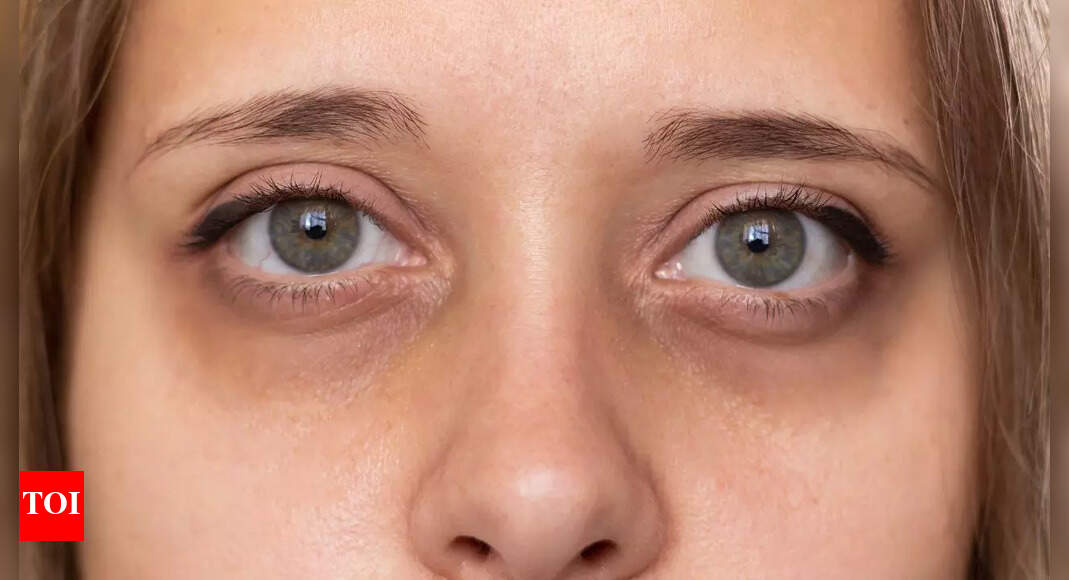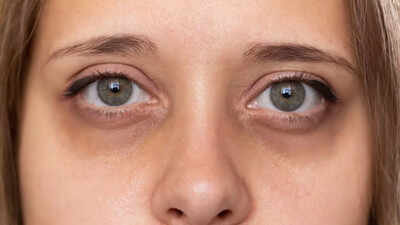
Dark circles under the eyes are often considered a sign of fatigue or lack of sleep, but they can sometimes signal deeper health issues. When you frequently notice dark, shadowy skin beneath your eyes even after getting enough rest, it may reflect imbalances or underlying problems within the body. In some cases, these dark circles may be linked to kidney or liver dysfunction, poor blood circulation, hormonal changes, or digestive disorders. Understanding what causes dark circles can help you identify whether they are temporary or related to a more serious condition that requires attention.
Persistent dark circles may signal: Kidney problems, liver stress, or gastritis
A study published in NIH, examines the prevalence of periorbital hyperpigmentation (dark circles) and its association with various factors, including stress and health conditions.
Kidney failure
Dark circles under the eyes can make the face appear tired and lifeless. In traditional medicine, weak kidney function is believed to contribute to dryness and dullness of the skin, particularly beneath the eyes. When the kidneys are not working efficiently, toxins may build up in the body, leading to fluid retention and pigmentation changes around the eye area. Over time, this can cause persistent dark shadows and a general lack of vitality.However, not all dark circles point to kidney disease. They can also appear due to stress, overwork, or irregular sleeping patterns. Mental strain and anxiety can reduce blood flow and oxygen supply to delicate facial skin, worsening discolouration. To support kidney health and reduce dark circles, it’s essential to maintain hydration, get enough sleep, and manage stress effectively through relaxation techniques or mindfulness. A balanced diet and regular exercise can also enhance circulation and energy levels.
Liver disease
The appearance of dark circles under the eyes can sometimes indicate chronic liver problems. A weakened liver may struggle to filter toxins from the blood, leading to dull and uneven skin tone. Studies suggest that around one-fifth of people with liver conditions experience noticeable darkening under the eyes. When the liver is inflamed or fatty, it can affect metabolism and oxygen supply to tissues, contributing to tired-looking eyes.If liver disease is suspected, it’s important to seek medical advice promptly. Along with medical treatment, patients should focus on dietary and lifestyle changes that support liver recovery. Consuming enough protein—such as from eggs, fish, lean meat, and dairy—helps the liver regenerate damaged cells. Reducing alcohol intake, avoiding processed foods, and staying active can also aid detoxification and improve the skin’s appearance. Early diagnosis and consistent care can help reverse mild liver dysfunction and reduce dark circles over time.
Irregular menstruation
For women, persistent dark circles under the eyes can also be linked to hormonal imbalance or menstrual irregularities. Traditional medicine associates poor blood circulation and “cold stagnation” in the body with darker under-eye pigmentation. When menstruation is delayed, painful, or heavy, blood flow may become restricted, reducing oxygen and nutrient delivery to facial skin. As a result, the eyes may appear sunken, tired, and prematurely aged.If menstrual issues persist, it’s advisable to consult a gynaecologist to rule out underlying conditions such as anaemia or hormonal imbalance. Managing stress, maintaining a consistent sleep schedule, and ensuring a diet rich in iron, vitamin B12, and folate can help improve blood circulation and skin tone. Herbal teas, moderate exercise, and adequate hydration may also support hormonal balance and reduce dark circles over time.
Chronic Gastritis
Dark circles are sometimes linked to digestive issues, particularly chronic gastritis. When the stomach lining is repeatedly inflamed, it affects nutrient absorption, leading to fatigue and a pale or dull complexion. Poor digestion and irregular eating habits can weaken the stomach’s ability to process food efficiently, causing toxin buildup that reflects on the skin, especially under the eyes.People suffering from chronic gastritis should follow a balanced, gentle diet and avoid irritants such as spicy, oily, or acidic foods. Eating smaller, more frequent meals and practising mindful eating can help stabilise digestion. As the stomach’s condition improves, nutrient absorption enhances, and dark circles may gradually lighten. Addressing stress is also important, as emotional tension can worsen gastritis and slow down recovery.In some cases, persistent nasal allergies or sinus congestion can also contribute to dark circles. Continuous sneezing, blocked sinuses, and poor nasal drainage increase pressure in the veins under the eyes, creating a bluish or purplish tint.
How to treat dark circles under the eyes
Treatment for dark circles depends on their root cause. In most cases, improving lifestyle habits can make a significant difference. Ensuring adequate sleep, managing stress, and maintaining a positive mindset are essential first steps. A diet rich in fruits, vegetables, lean protein, and whole grains supports healthy skin and organ function. Regular exercise, including walking, yoga, or swimming, improves blood circulation and oxygen delivery to facial tissues.For temporary relief, natural remedies like chilled cucumber slices, tomato pulp, or potato juice applied under the eyes can help soothe puffiness and brighten skin. However, these should complement, not replace, healthy living. If dark circles persist or appear alongside other unusual symptoms like swelling, fatigue, or digestive issues, consult a healthcare professional for proper diagnosis and treatment.In summary, while dark circles are often cosmetic and linked to tiredness, they can also reflect underlying imbalances in kidney, liver, digestive, or hormonal health. Paying attention to your body’s signals, adopting a balanced routine, and seeking timely medical advice are key to improving both skin appearance and overall well-being.Disclaimer: This article is for general informational purposes only and is not a substitute for professional medical advice, diagnosis, or treatment. Always seek the guidance of a qualified healthcare provider regarding any medical condition or lifestyle change.Also Read: Sabudana health risks: 5 types of people who should avoid it this Navratri







